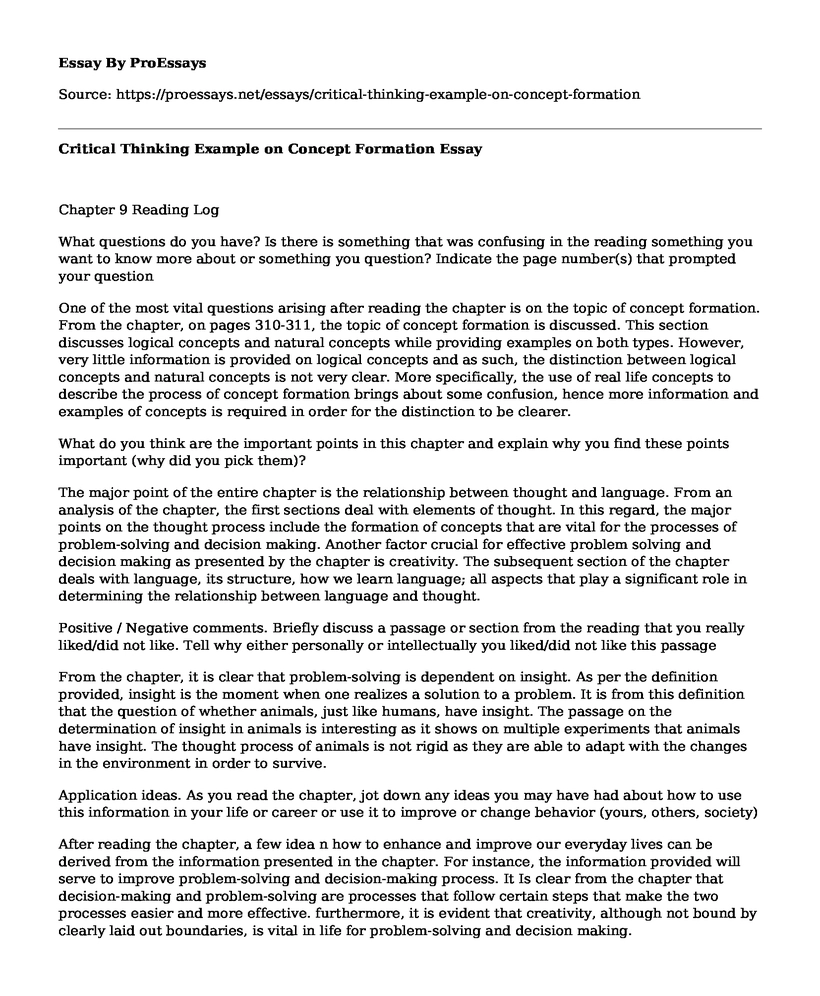Chapter 9 Reading Log
What questions do you have? Is there is something that was confusing in the reading something you want to know more about or something you question? Indicate the page number(s) that prompted your question
One of the most vital questions arising after reading the chapter is on the topic of concept formation. From the chapter, on pages 310-311, the topic of concept formation is discussed. This section discusses logical concepts and natural concepts while providing examples on both types. However, very little information is provided on logical concepts and as such, the distinction between logical concepts and natural concepts is not very clear. More specifically, the use of real life concepts to describe the process of concept formation brings about some confusion, hence more information and examples of concepts is required in order for the distinction to be clearer.
What do you think are the important points in this chapter and explain why you find these points important (why did you pick them)?
The major point of the entire chapter is the relationship between thought and language. From an analysis of the chapter, the first sections deal with elements of thought. In this regard, the major points on the thought process include the formation of concepts that are vital for the processes of problem-solving and decision making. Another factor crucial for effective problem solving and decision making as presented by the chapter is creativity. The subsequent section of the chapter deals with language, its structure, how we learn language; all aspects that play a significant role in determining the relationship between language and thought.
Positive / Negative comments. Briefly discuss a passage or section from the reading that you really liked/did not like. Tell why either personally or intellectually you liked/did not like this passage
From the chapter, it is clear that problem-solving is dependent on insight. As per the definition provided, insight is the moment when one realizes a solution to a problem. It is from this definition that the question of whether animals, just like humans, have insight. The passage on the determination of insight in animals is interesting as it shows on multiple experiments that animals have insight. The thought process of animals is not rigid as they are able to adapt with the changes in the environment in order to survive.
Application ideas. As you read the chapter, jot down any ideas you may have had about how to use this information in your life or career or use it to improve or change behavior (yours, others, society)
After reading the chapter, a few idea n how to enhance and improve our everyday lives can be derived from the information presented in the chapter. For instance, the information provided will serve to improve problem-solving and decision-making process. It Is clear from the chapter that decision-making and problem-solving are processes that follow certain steps that make the two processes easier and more effective. furthermore, it is evident that creativity, although not bound by clearly laid out boundaries, is vital in life for problem-solving and decision making.
Cite this page
Critical Thinking Example on Concept Formation. (2021, Apr 12). Retrieved from https://proessays.net/essays/critical-thinking-example-on-concept-formation
If you are the original author of this essay and no longer wish to have it published on the ProEssays website, please click below to request its removal:
- Essay on Increasing College Completion for Latino/as in Community Colleges
- Understand College Student Leadership Development - Critical Essay
- Outcomes of Children Discharged from Mental Care Facilities
- Letter to the Undergraduate Selection School Committee Paper Example
- Student's Well Being Quantitative Study Paper Example
- Essay Sample on Kids: Active Agents in Society's Structures & Change
- Essay on Fostering Vision and Mission Integration in Fine View School: Strategies and Communication Approaches







